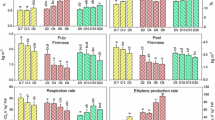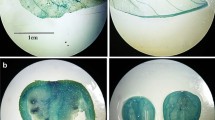Abstract
The effects of extended heat stress on polygalacturonase (PG; EC 3.2.1.15) and pectin methylesterase (PME; EC 3.1.1.11) gene expression at mRNA, protein and activity levels in ripening tomato fruits were investigated. Steady state levels of PG mRNA declined at temperatures of 27°C and above, and a marked reduction in PG protein and activity was observed at temperatures of 32°C and above. Exogenous ethylene treatment did not reverse heat stress-induced inhibition of PG gene expression. Transfer of heat-stressed fruits to 20°C partly restored PG mRNA accumulation, but the rate of PG mRNA accumulation declined exponentially with duration of heat stress. Heat stress-induced inhibition of PME mRNA accumulation was recoverable even after 14 days of heat stress. In fruits held at 34°C, both PG and PME protein and activity continued to accumulate for about 4 days, but thereafter PG protein and activity declined while little change was observed in PME protein and activity. In spite of increases in mRNA levels of both PG and PME during the recovery of heat-stressed fruit at 20°C, levels of PG protein and activity declined in fruits heat-stressed for four or more days while PME protein and activity levels remained unchanged. Collectively, these data suggest that PG gene expression is being gradually and irreversibly shut off during heat stress, while PME gene expression is much less sensitive to heat stress.
Similar content being viewed by others
References
Belanger FC, Brodl MR, Ho TD: Heat shock causes destabilization of specific mRNAs and destruction of endoplasmic reticulum in barley aleurone cells. Proc Natl Acad Sci USA 83: 1354–1358 (1986).
Biggs MS, Handa AK: Temporal regulation of polygalacturonase gene expression in fruits of normal, mutant, and heterozygous tomato genotypes. Plant Physiol 89: 117–125 (1989).
Biggs MS, Harriman RW, Handa AK: Changes in gene expression during tomato fruit ripening. Plant Physiol 81: 395–403 (1986).
Biggs MS, Woodson WR, Handa AK: Biochemical basis of high temperature inhibition of ethylene biosynthesis in ripening tomato fruits. Physiol Plant 72: 572–578 (1988).
Brodl MR: Biochemistry of heat shock responses in plants. In: Ktterman, F (ed) Environmental Injury to Plants, pp. 113–135. Academic Press, San Diego, FL (1990).
Brodl MR, Ho TD: Heat shock causes selective de stabilization of secretory protein mRNA in barley aleurone cells. Plant Physiol 96: 1048–1052 (1991).
Cheng TS, Floros JD, Shewfelt RL, Chang CJ: The effect of high-temperature stress on ripening of tomatoes (Lycopersicon esculentum). J Plant Physiol 132: 459–464 (1988).
DellaPenna D, Alexander DC, Bennett AB: Molecular cloning of tomato fruit polygalacturonase: analysis of polygalacturonase levels during ripening. Proc Natl Acad Sci USA 83: 6420–6424 (1986).
Eaks I: Ripening, respiration and ethylene production of ‘Haas’ avocado fruits at 20 to 40°C. J Am Soc Hort Sci 103: 576–578 (1978).
Gaffe J, Tieman DM, Handa AK: Pectin methylesterase isoforms in tomato (Lycopersicon esculentum) tissues: Effects of expression of a pectin methylesterase antisense gene. Plant Physiol 105: 199–203 (1994).
Goodwin TW, Jamikorn M: Biosynthesis of carotenes in ripening tomatoes. Nature 170: 104–105 (1952).
Hanson E: Quantitative study of ethylene production in relation to respiration in pears. Bot Gaz 103: 543–558 (1942).
Hartree EF: Determination of protein: a modification of the Lowry method that gives a linear photometric response. Anal Biochem 48: 422–427 (1972).
Harriman RW, Tieman DM, Handa AK: Molecular cloning of tomato pectin methylesterase gene and its expression in Rutgers, Ripening Inhibitor, Nonripening and Never ripe tomato fruits. Plant Physiol 97: 80–87 (1991).
Hendrick JP, Hartl F-U: Molecular chaperone functions of heat-shock proteins. Annu Rev Biochem 62: 349–384 (1993).
Lindquist S: Regulation of protein synthesis during heat shock. Nature 294: 311–314 (1981).
Lindquist S, Craig EA: The heat shock proteins. Annu Rev Genet 22: 631–677 (1988).
Marlow SJ, Handa AK: Immuno slot-blot assay using a membrane which covalently binds protein. J Immunol Meth 101: 133–139 (1987).
Maunder SM, Holdsworth M, Slater A, Knapp J, Bird C, Schuch W, Grierson D: Ethylene stimulates the accumulation of ripening related mRNAs in tomatoes. Plant Cell Environ 10: 177–184 (1987).
Montgomery J, Pillard V, Deikman J, Fischer RL: Positive and negative regulatory regions control the spatial distribution of polygalacturonase transcription in tomato fruit percarp. Plant Cell 5: 1049–1062 (1993).
Nagao RT, Kimpel JA, Vierling E, Key JL: The heat shock response: a comparative analysis. In: Miflin BJ (ed) Oxford Surveys of Plant Molecular and Cell Biology, vol. 3, pp. 348–438. Oxford University Press, Oxford, UK (1986).
Oeller PW, Wong LM, Taylor LP, Pike DA, Theologis A: Reversible inhibition of tomato fruit senescence by antisense 1-aminocyclopropane-1-carboxylase synthase. Science 254: 427–439 (1991).
Ogura N, Hayashi R, Ogishima T, Abe Y, Nakagawa H, Takenhana H: Ethylene production by tomato fruits at various temperatures and effect of ethylene treatment on fruits (studies on storage temperature of tomato fruits, Part IV). J Agr Chem Soc Japan 50: 519–523 (1976).
Picton S, Grierson D: Inhibition of expression of tomato-ripening genes as high temperature. Plant Cell Envir 11: 265–272 (1988).
Ray J, Knapp J, Grierson D, Bird C, Schuch W: Identification and sequence determination for tomato pectin esterase. Eur J Biochem 174: 119–124 (1988).
Sheehy RE, Pearson J, Brady CJ, Hiatt WR: Molecular characterization of tomato fruit polyaalacturonase. Mol Gen Genet 208: 30–36 (1987).
Tomes ML: Temperature inhibition of carotene synthesis in tomato. Bot Gaz 124: 180–185 (1963).
Vierling E: The roles of heat shock proteins in plants. Annu Rev Plant Physiol Plant Mol Biol 42: 579–620 (1991).
Vierling E, Key JL: Ribulose 1,5-bisphosphate carboxylase synthesis during heat shock. Plant Physiol 78: 155–162 (1985).
Yoshida O, Nakagawa H, Ogura N, Sato T: Effect of heat treatment on the development of polygalaturonase activity in tomato fruit during ripening. Plant Cell Physiol 25: 505–509 (1984).
Zheng L, Heupel RC, DellaPenna D: The β subunit of tomato fruit polygalacturonase isozyme. 1. Isolation, characterization, and identification of unique structural features. Plant Cell 4: 1147–1156 (1992).
Author information
Authors and Affiliations
Rights and permissions
About this article
Cite this article
Kagan-Zur, V., Tieman, D.M., Marlow, S.J. et al. Differential regulation of polygalacturonase and pectin methylesterase gene expression during and after heat stress in ripening tomato (Lycopersicon esculentum Mill.) fruits. Plant Mol Biol 29, 1101–1110 (1995). https://doi.org/10.1007/BF00020455
Received:
Accepted:
Issue Date:
DOI: https://doi.org/10.1007/BF00020455




